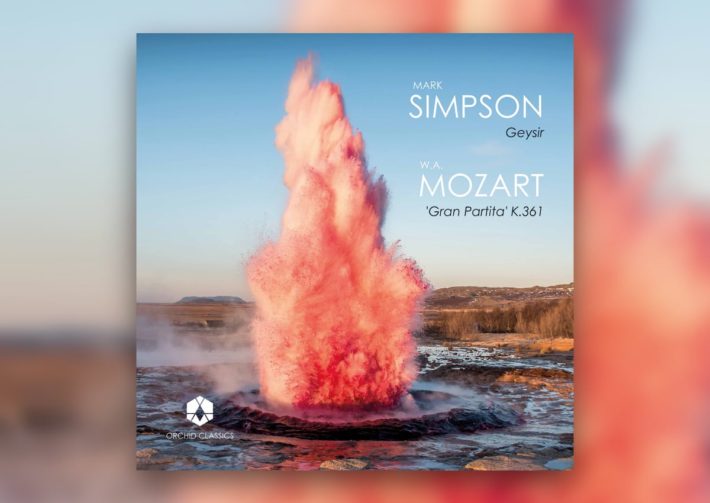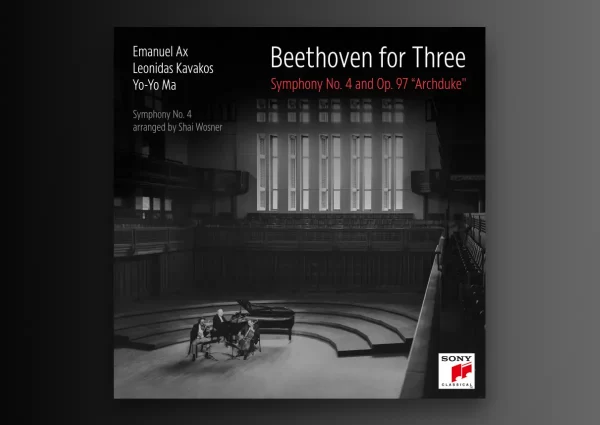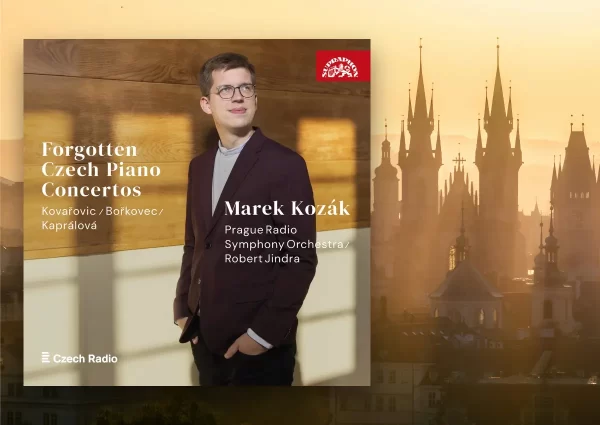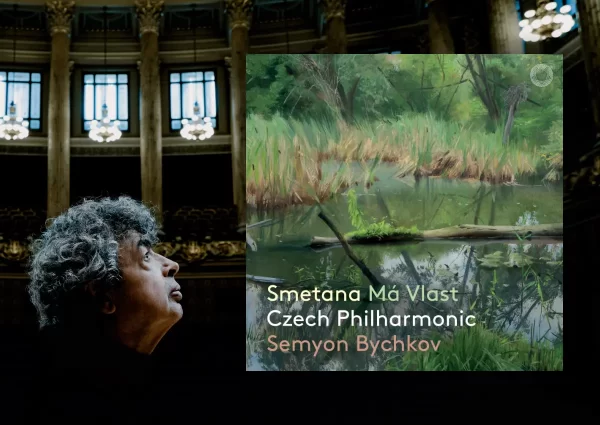This absorbing new album pairs an established masterpiece with a remarkable new composition by composer Mark Simpson, “Geysir”. I find Simpson’s pulsating rhythms and wild colors a wholly accurate aural picture of this geo-thermal marvel. His music’s whirling, wildly chromatic lines cascade over one another, building with ever increasing intensity into an eruptive climax (4’54”). The musical depiction is so spot-on, I found it difficult to accept any other imagery. No matter, as any issue around pictorial accuracy is secondary to the quality of the writing itself, which is fabulous. Simpson’s twelve-member ensemble (he also plays clarinet in the group) delivers a virtuosic tour-de-force performance, played with brio and panache. Each listening reveals new interesting features missed before; this is contemporary music that wind ensembles should make part of their regular repertoire.
Mozart’s “Grand Partita” also receives an impressive performance, though there are numerous performances of similar excellence. The opening movement affirms the ensemble’s interpretative stance: bold colors, liquid lyricism, heightened dynamic contrasts, and careful attention to articulation and phrasing, allied with splendid technical virtuosity. Sample the opening minute of the first movement to hear how acutely these players listens to one another, producing a well-balanced, fulsome ensemble. Yet how easily they modify their attack and color for duet and solo passages, using subtle rubato to breathe life into the phrase. The Allegro (2’00”) takes off like a rocket, with precise execution and bountiful energy.
Each movement features impressive solo and ensemble playing. Throughout, intonation is spotless, and tempos are spot on. Yet by the end I felt slightly worn down, and after repeated listening I attribute that feeling to the recorded sound. While it has plenty of bloom and each instrument is clearly audible, there is a ‘in your face’ quality, as if the listener is seating in the front row of a small, low-ceilinged hall. This gives even the most delicate moments and softest dynamics an unwanted fullness that feels slightly oppressive. For comparison, I listened to a new recording by the members of the Royal Concertgebouw Orchestra led by Alexei Ogrintchouk (BIS 2463). Neither ensemble outplays the other. But the BIS engineering places the listener in a larger hall, further back from the players, which allows for a more nuanced and refined listening experience.
Related Classical Music Reviews
- Review: Mozart – Violin Concertos – Christoph Koncz, Les Musiciens du Louvre
- Review: “The Messenger” – Hélène Grimaud Plays Mozart and Silvestrov
- Review: Contemporary Clarinet Concertos – Jean-Luc Votano
There are also times in which the Concertgebouw players create a more rapt, introspective atmosphere. Both performances perform the famous third movement Adagio in 5’07.” But Simpson’s wind band generates an insistent momentum that robs the music of its gentle grace: a quality more readily heard from Ogrintchouk and his players. Simpson’s Minuets (tracks 3 and 5) also have an overly incessant drive that certainly relates to dance, but lacks the elegance found in Amsterdam. These are but momentary displeasures – a highpoint in Simpson’s performance is the Adagio portion of the Romance (track 6), with lush playing by the clarinets and oboes, and magically hushed pianissimos.
Simpson’s ensemble plays Mozart with meticulousness care and great sensitivity. I would characterize the entire performance as extroverted, and it is certainly a convincing reading. Nevertheless, I would urge everyone to hear Simpson’s “Geysir”; lovers of wind ensemble music need not hesitate.

Simpson – “Geysir”
Mozart – Serenade No. 10 for wind instruments (“Grand Partita”), K.361
Mark Simpson, Fraser Langton – Clarinet
Nicholas Daniel, Emma Feilding – Oboe
Amy Harman, Dom Tyler – Bassoon
Oliver Pashley, Ausiàs Garrigós Morant – Basset Horns
Ben Goldscheider, Angela Barnes, James Pillai, Fabian van de Geest – Horns David Stark – Double Bass
Included with an Apple Music subscription:
Related Amazon Products
Mozart: Serenade in B-flat Major, K. 361 (370a) – “Gran Partita” (Study Score)
$24.95 (as of April 27, 2024 15:08 GMT +03:00 – More infoProduct prices and availability are accurate as of the date/time indicated and are subject to change. Any price and availability information displayed on [relevant Amazon Site(s), as applicable] at the time of purchase will apply to the purchase of this product.)J.S. Bach, Partita for Solo Flute in A Minor BWV 1013
Partita in a minor for flute solo BWV 1013 (Urtext edition)
$5.95 (as of April 27, 2024 15:08 GMT +03:00 – More infoProduct prices and availability are accurate as of the date/time indicated and are subject to change. Any price and availability information displayed on [relevant Amazon Site(s), as applicable] at the time of purchase will apply to the purchase of this product.)Mozart on Tour – Episode 13: Vienna III
(as of April 27, 2024 15:08 GMT +03:00 – More infoProduct prices and availability are accurate as of the date/time indicated and are subject to change. Any price and availability information displayed on [relevant Amazon Site(s), as applicable] at the time of purchase will apply to the purchase of this product.)The Mozart Violin Concerti: A Facsimile Edition of the Autographs (Dover Orchestral Music Scores)
35% OffRead more classical music reviews or visit The Classic Review Amazon store
Follow Us and Comment:
Get our periodic classical music newsletter with our recent reviews, news and beginners guides.
We respect your privacy.




















